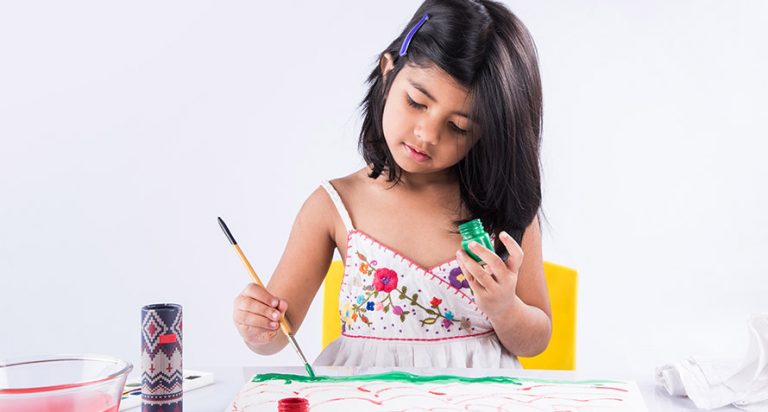What are the Reasons for Concentration Problem in a Child

Concentration is a vital skill for children, laying the foundation for academic success and overall well-being. However, many children struggle to focus in today’s fast-paced world filled with distractions. From technological advancements to educational pressures and even biological factors, various elements contribute to focusing problems in child. It might seem worrisome; some parents may wonder if something is wrong with their children. But rest assured, concentration problems are very common in children. Read on to understand what concentration problems in kids are and how you can help your child develop focus.
What Are Concentration Problems in Children?
If your child has difficulty focusing on something for very long, he may be suffering from some problems with concentration. Lack of concentration in a child can stem from a multitude of factors, including environmental distractions, underlying medical conditions, emotional disturbances, or simply a mismatch between their learning style and educational approach (1). This lack of focus can be seen in his studies and other activities as well.
How to Know Your Child Lacks Concentration?
Recognising signs of a lack of concentration in your child is crucial for providing timely support and intervention. Here is the list of things you may notice in your child if he is having trouble with concentration:
- Distracted very easily
- Fidgety
- Prone to losing things
- Unable to keep things organised
- Unable to follow instructions
- Has trouble with school work
- Moody, irritable or aggressive
- Unable to maintain friendships
Causes of Concentration Problems in Kids and Their Solutions
Understanding the root causes behind concentration problems in children is the first step towards implementing effective solutions. Here are some of the things that may be responsible for concentration difficulty in a child:
1. Difficult Tasks
If your child finds the tasks challenging to manage, he will not be able to concentrate on them well.
What You Can Do About It ?
Break the big tasks down into smaller ones that appear simpler to your child and ensure they are age-appropriate.
2. Available Distractions
Children are naturally curious but not very eager to sit down in one place and concentrate. Their wandering minds are more likely to get distracted by anything, such as the TV, radio (6), things going on outside the window, etc.
What You Can Do About It ?
Ensure that the room your child is working in is free from distractions.
3. Seek Attention From Parents
Behaving negatively is a common way for children to get their parent’s attention, and not doing their work and not concentrating properly can often be a way to get it.
What You Can Do About It ?
Spend some quality time with your child every day. This will make them less likely to keep losing focus when you are trying to help them with their school work or other activities.
4. Diet Matters
Poor nutrition and skipping breakfast is a very common reason for poor concentration.
What You Can Do About It ?
Stick to giving your child a well-balanced diet daily and ensure he does not skip breakfast (7).
5. Not Enough Sleep
Children need to get at least eight to twelve hours of sleep every night to be at their best . Those who do not get enough will naturally be unable to concentrate well on the tasks (3).
What You Can Do About It ?
Ensure your child has a good sleeping routine, and do not allow him to stay up too late at night. Depending on his age, the best hours for your little one to sleep are from 7:30 onwards.
6. Personal Problems
Troubled children naturally affect their ability to concentrate. If there is trouble at home, your child will most likely be disturbed and find focusing on his regular activities challenging.
What You Can Do About It ?
If there is trouble at home, try to keep it away from your child, as it can damage him.
7. No Motivation or Interest
Children who are not interested in something will have trouble focusing on it. Lack of motivation is another reason they may find concentrating challenging. Lack of interest or motivation most often affects more advanced children.
What You Can Do About It ?
Find a way to keep your child motivated and interested in the subject. Consult a professional if you cannot find a way to do this yourself.
8. Lack of Exercise
Without the proper amount of physical exercise, your child is bound to become lazy and lethargic, and their powers of concentration will also wane (5).
What You Can Do About It ?
Switch off the TV, put down the smartphones and get off the computer. Take your child out; ride bikes together, play catch or walk the dog. Physical exercise is essential.
9. Grief
If there has been a loss in the family, such as the death of a loved one, it can negatively impact your child’s concentration.
What You Can Do About It ?
Talk to your child or send him for counselling if needed. Help your child through a difficult time.
10. Mismatched Learning Style
Not all children learn the same way. Some are better at reading and writing, but others are more practical.
What You Can Do About It ?
Find the right style of learning for your child.
11. Organisation Problems
If your child has a disorganised workspace or notebook, he may spend more time looking for the right material than paying attention to what is taught.
What You Can Do About It ?
Help your child organise his school bag and make sure that you check his work every day. Teach your child to be organised, as it will help him greatly in the long run.
12. Learning Difficulties
Learning difficulties such as ADD, Dyslexia, or ADHD may be responsible for the inability to concentrate (2).
What You Can Do About It ?
Consult a professional for a thorough diagnosis and seek guidance on moving forward if your child has a learning disability.
FAQs
1. What role does technology play in exacerbating concentration problems in children?
Excessive screen time can contribute to attention issues, especially on devices with prompting content (4). Setting limits on screen time, encouraging breaks, and promoting alternative activities like outdoor play or reading can help mitigate these effects.
2. Can cognitive training exercises or activities help improve a child’s concentration skills?
Cognitive training exercises, such as mindfulness practices, memory games, and attention-building activities, can strengthen neural pathways associated with concentration and attention. Incorporating these exercises into daily routines can help enhance a child’s ability to sustain focus over time.
Addressing issues that can have a major influence on your child’s concentration will go a long way. Rectifying concentration issues in child not only help him in school but also through his adult life, especially when it pertains building a better career.
References/Resources:
1. Not All Attention Problems Are ADHD; Child Mind Institute; https://childmind.org/article/not-all-attention-problems-are-adhd/
2. Overactivity and poor concentration; Mentally Healthy Schools; https://www.mentallyhealthyschools.org.uk/mental-health-needs/overactivity-and-poor-concentration/
3. Understanding why kids have trouble with focus; Understood; https://www.understood.org/en/articles/child-trouble-focusing
4. Ricci. R. C, Paulo. A. S. C, Freitas. A. K. P. B, et al.; Impacts of technology on children’s health: a systematic review; PubMed Central; https://www.ncbi.nlm.nih.gov/pmc/articles/PMC9273128/
5. Bidzan-Bluma. I, Lipowska. M; Physical Activity and Cognitive Functioning of Children: A Systematic Review; PubMed Central; https://www.ncbi.nlm.nih.gov/pmc/articles/PMC5923842/
6. Vedechkina. M, Borgonovi. F; A Review of Evidence on the Role of Digital Technology in Shaping Attention and Cognitive Control in Children; PubMed Central; https://www.ncbi.nlm.nih.gov/pmc/articles/PMC7943608/
7. Foods linked to better brainpower; Harvard Health Publishing; https://www.health.harvard.edu/healthbeat/foods-linked-to-better-brainpower; April 2024
Also Read:
Oppositional Defiant Disorder in Children
Most Effective Ways to Improve Your Child’s Concentration
Mental Disorder in Kids – Causes, Symptoms and Treatment
Mind- Boggling Brain Games for Kids to Boost Thinking Capability
Was This Article Helpful?
Parenting is a huge responsibility, for you as a caregiver, but also for us as a parenting content platform. We understand that and take our responsibility of creating credible content seriously. FirstCry Parenting articles are written and published only after extensive research using factually sound references to deliver quality content that is accurate, validated by experts, and completely reliable. To understand how we go about creating content that is credible, read our editorial policy here.















.svg)
















